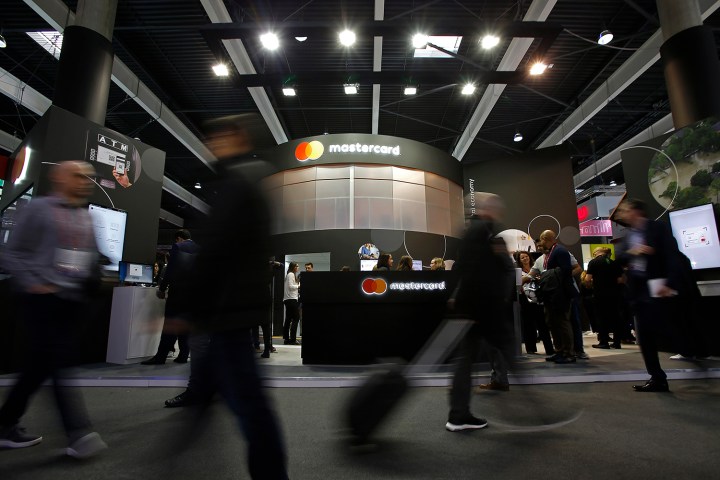
(in)Secure is a weekly column that dives into the rapidly escalating topic of cybersecurity.
Blockchain, the technology behind Bitcoin, has captured the interest of everyone from Facebook to Microsoft. One of the biggest investors in the technology has been Mastercard, holding nearly thirty blockchain patents to its name.
What does a company like Mastercard want to do with all that blockchain tech? It wants to make the future of money look a bit more like Bitcoin.
Stopping the skimmers
According to the ATM Industry Association, two billion in losses from credit card “skimming” occur each year around the world. Using a skimming device at places like gas stations and ATMs, thieves can easily steal credit card information from those who previously used it. While chip cards have done a lot to solve that problem, companies like Mastercard always need to stay one step ahead of hackers.
“Utilizing blockchain technology, Mastercard will be able to eradicate many of the fraudulent activities”
“Every year, billions of dollars are stolen through identity theft and skimming credit cards,” said Arran Stewart, an expert on blockchain from Job.com, told Digital Trends. “Utilizing blockchain technology, Mastercard will be able to eradicate many of the fraudulent activities that happen through the abuse of their card services.”
Stewart is the co-owner of the recruitment platform Job.com, which implements a smart contract on the blockchain to facilitate private information, not unlike how Mastercard proposes to do it.
Mastercard’s patent would put credit cards on a publicly-accessible blockchain, which can then verify payments in a secured fashion. Stewart explained that Mastercard could remedy the problem by encoding an image of a payment card to the blockchain and then encrypt it with a public and private key. Once the payment is finished, the system decrypts the card image using those private keys.

Despite blockchain’s many demonstrated use cases, its application in finances have always been important. It’s the backbone of how a cryptocurrency like Bitcoin functions — a public database that allows the currency to exist without direct oversight from a single entity, known as a “distributed ledger.”
However, Mastercard’s interest in blockchain goes far beyond this single patent. In fact, the company is one of the largest holders of blockchain-related patents in the world.
Blockchain money
In the last few months, Mastercard has created a program that allows developers to build new applications on top of its own set of APIs. That helps Mastercard work closer with companies like PayPal and Apple and opens interesting new opportunities that take blockchain even further.
Consider the tourism and hospitality industry. Mastercard has developed a platform that would let travelers to plans and personal information privately, and then reap the reward of finding the best deals for their trip.
Mastercard has created a program that lets developers build new applications on top of its own set of APIs
“Mastercard has recognized the value in the travel industry and are providing a platform that allows holidaymakers/travel seekers and others to tell the tourism world where they wish to go privately through blockchain encryption,” said Stewart. “Airlines, travel companies, hotels and many others will be able to bid to offer that user the best possible price and service over other competing bidding providers, all powered on Mastercard’s blockchain.”
It’s a fascinating idea, but tourism is only the tip of the iceberg. Mastercard has a number of applications, from sending money, to setting budgets through voice assistants, paying employees instantly and securely, and, most interestingly, something it calls “proof of provenance.” It’s a way of creating a transparent supply chain that both consumers and wholesalers will have access to. That could help both restaurants and ordinary people keep track of where the food on their plate comes from.
“Transparency in the supply chain has been something that consumers and wholesalers have been looking for since supply goods began,” said Stewart. “Proof of provenance is the future of knowing where and how goods and services reach the hands of the consumer. Blockchain will be the backbone of this and one major example of this being put into practice will be Amazon utilizing this technology to provide evidence of the supply of their goods. This technology will also reduce loss, damage, theft and time to deliver within any supply chain.”

Obviously, Mastercard isn’t the only financial company developing new technology on the blockchain. Competitors like Visa and American Express aren’t far behind, and both have numerous secured patents in the blockchain world. Despite the fact that Mastercard is ahead of the pack, Visa patented a “digital asset network” based in blockchain in August of last year. What it’ll do with these patents is still unclear, but it seems Mastercard won’t be the only player in the game.
While we shouldn’t expect financial institutions to embrace cryptocurrency anytime soon, it’s clear our money is going to function a lot more like Bitcoin than dollar bills in the future.


